课件:Unit2 Grammar(译林牛津版七年级上)
合集下载
牛津译林英语 七年级上册unit2Grammar (共36张PPT)

He/She/It likes sports. Does he/she/it like sports?
Yes, he/she/it does. No, he/she/it does not.
Hale Waihona Puke ★一般疑问句式及答语: Do / Does +主语+ 动词原形+ 其他? e.g. 1. – Do you get up at 6:00 every
第三人称:除第一、第二人称外都属于
第三人称,指单个人或事物的就属于第
三人称单数,如:he, she, it, Millie, the cat, a desk, China, my classmate等等。
三、什么叫行为动词? 有具体、实际含义的动词叫行为动词, 如come, go, run, think, stand等。 注意:be动词不属于行为动词。在一般 现在时中,以行为动词作谓语时不能再 使用be动词。如:
★肯定句式: 主语+ 动词原形/动词第三人称单数形式+ 其他. e.g. I like reading very much.
我非常喜欢阅读。
He usually has lunch at school. 他通常在学校吃午餐。
They do morning exercises at8:00every day. 他们每天八点做早操。 My cat likes to sleep under the chair. 我的猫喜欢在椅子下面睡觉。
He is from China.
(√)
He comes from China. (√)
He is comes from China. (×)
四、何时使用一般现在时? 行为动词的一般现在时可用于以下情况:
牛津译林英语 七年级上册unit2Grammar(共17张PPT)
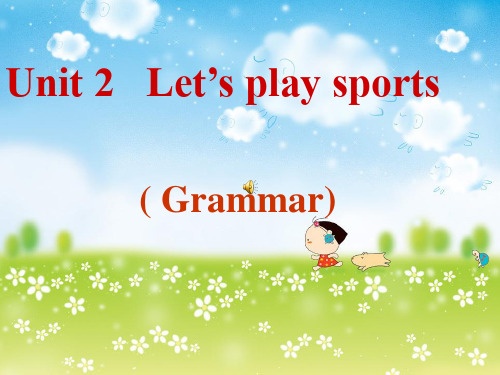
我们禁止在图书馆吵闹。
When I was young, my father always told me:
A. Read more books, and you will be more clever. B. Read more books, but you don’t have to read
势,使他 客观地 认识自 己,正确 的 每 天提前 15分钟 到科室 ,工作 充 组织大 家聚餐 、外出 旅行,增 进同 了团队 的向心 力和凝 聚力。 士进行 正确定 位,充分 挖掘每 短;批 评讲 究艺术 ,分配上 公平
Unit 2 Let’s play sports
( Grammar)
I‘m Mr Su. I’m an English teacher.
Can’t watch too much TV. Can’t play computers too much.
Can’t play mobile phones too much.
You mustn’t watch too much TV.
You mustn’t play computers too much.
Nantong is my hometown. I come from there.
Reading is my favourite.
Nice to meet you!
ቤተ መጻሕፍቲ ባይዱ
Don’t watch too much TV. Don’t play computers too much.
Don’t play mobile phones too much.
books all day long.
( the letter to Dr.Know )
When I was young, my father always told me:
A. Read more books, and you will be more clever. B. Read more books, but you don’t have to read
势,使他 客观地 认识自 己,正确 的 每 天提前 15分钟 到科室 ,工作 充 组织大 家聚餐 、外出 旅行,增 进同 了团队 的向心 力和凝 聚力。 士进行 正确定 位,充分 挖掘每 短;批 评讲 究艺术 ,分配上 公平
Unit 2 Let’s play sports
( Grammar)
I‘m Mr Su. I’m an English teacher.
Can’t watch too much TV. Can’t play computers too much.
Can’t play mobile phones too much.
You mustn’t watch too much TV.
You mustn’t play computers too much.
Nantong is my hometown. I come from there.
Reading is my favourite.
Nice to meet you!
ቤተ መጻሕፍቲ ባይዱ
Don’t watch too much TV. Don’t play computers too much.
Don’t play mobile phones too much.
books all day long.
( the letter to Dr.Know )
牛津译林英语 七年级上册unit2Grammar (共24张PPT)
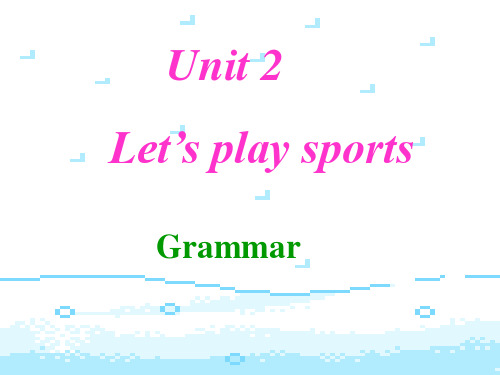
客观存在的事实 Things that are true now.
目前存在的事实
3
We use the simple present
tense when we talk about :
things that are always true
things that are true now
f ah
cg
d
b
e i
a.Fish live in water. b.I go to school every
day. c.I live in Nanjing. d.I am a student. e.I have breakfast at
7.00a.m. f.Nice music makes us
happy. g.Kitty likes stickers. h.The elephant has
evening and _g_o__e__s_(go) to bed late.
四.完成下列句子:
1M.y我un叔cl叔eu通s常u每a_天_l_l去_y_跑__g步__半o_小_e_时_s_。__r_u__n__n__i_n_ g
half an hour for _______ ______ ______ every day.
__b_e___ 动词和_行__为___动词。
ห้องสมุดไป่ตู้
【学海拾贝】
二.读书本P23请归纳三单式的构成并写出s或es 的读音。
直接加s walks /s / plays /z /
以辅音加y结尾,把y改成i再加es
study ---studies /iz/ carry---carries /iz /
以s,ss, ch, sh, x, o结尾的加es
目前存在的事实
3
We use the simple present
tense when we talk about :
things that are always true
things that are true now
f ah
cg
d
b
e i
a.Fish live in water. b.I go to school every
day. c.I live in Nanjing. d.I am a student. e.I have breakfast at
7.00a.m. f.Nice music makes us
happy. g.Kitty likes stickers. h.The elephant has
evening and _g_o__e__s_(go) to bed late.
四.完成下列句子:
1M.y我un叔cl叔eu通s常u每a_天_l_l去_y_跑__g步__半o_小_e_时_s_。__r_u__n__n__i_n_ g
half an hour for _______ ______ ______ every day.
__b_e___ 动词和_行__为___动词。
ห้องสมุดไป่ตู้
【学海拾贝】
二.读书本P23请归纳三单式的构成并写出s或es 的读音。
直接加s walks /s / plays /z /
以辅音加y结尾,把y改成i再加es
study ---studies /iz/ carry---carries /iz /
以s,ss, ch, sh, x, o结尾的加es
牛津译林版七年级英语上册Unit 2 Grammar课件

I We
You + like sports.
They
当主语是第一人称、第二人称、第三人称复数时,
谓语动词以_动__词__原__形____构成。
How to change into negative sentences
Activity 1: Look and say.
1. I talk to my parents at lunchtime. →I don’t talk to my parents at lunchtime.
4. 他们每天带小狗出去散步。 _T_h_e_y__ta_k_e__th_e__d_o_g_f_o_r_a__w_a_lk__e_v_e_ry__d_a_y_. _________
How to use the simple present tense of the verb to do
Activity 2: Work out the rule.
3. We often go shopping at weekends. _W__e_d_o_n_’_t _o_ft_e_n__go__s_h_o_p_p_in__g_a_t_w_e_e_k_e_n_d_s_._______ _D_o__y_o_u_o_f_t_e_n_g_o__sh__o_p_p_in_g__a_t _w_e_e_k_e_n_d_s_?________ _Y_e_s_, _w_e_d_o_._/_N__o_,_w_e__d_o_n_’t_.___________________
4. 米莉在晚上写作业。 _M__i_ll_ie__d_o_es__h_e_r_h_o_m__e_w_o_r_k_i_n_t_h_e_e_v_e_n_i_n_g_. _______
How to use the simple present tense of the verb to do
You + like sports.
They
当主语是第一人称、第二人称、第三人称复数时,
谓语动词以_动__词__原__形____构成。
How to change into negative sentences
Activity 1: Look and say.
1. I talk to my parents at lunchtime. →I don’t talk to my parents at lunchtime.
4. 他们每天带小狗出去散步。 _T_h_e_y__ta_k_e__th_e__d_o_g_f_o_r_a__w_a_lk__e_v_e_ry__d_a_y_. _________
How to use the simple present tense of the verb to do
Activity 2: Work out the rule.
3. We often go shopping at weekends. _W__e_d_o_n_’_t _o_ft_e_n__go__s_h_o_p_p_in__g_a_t_w_e_e_k_e_n_d_s_._______ _D_o__y_o_u_o_f_t_e_n_g_o__sh__o_p_p_in_g__a_t _w_e_e_k_e_n_d_s_?________ _Y_e_s_, _w_e_d_o_._/_N__o_,_w_e__d_o_n_’t_.___________________
4. 米莉在晚上写作业。 _M__i_ll_ie__d_o_es__h_e_r_h_o_m__e_w_o_r_k_i_n_t_h_e_e_v_e_n_i_n_g_. _______
How to use the simple present tense of the verb to do
牛津译林英语 七年级上册unit2Grammar(共26张PPT)
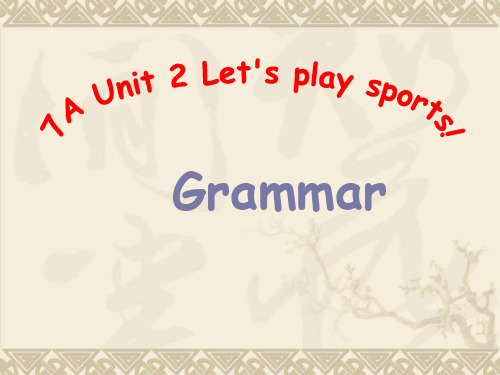
3. She takes a bus to school every day. (同上) She doesn’t take a bus to school every day.
Task Three do not/ I / You /We/ They don’t like sports. He / She / It does not/ doesn’t
and complete the exercises of this lesson. 2. Preview the next lesson.
Task One Verb “to do” 1. things that are true now
He plays football every aftertoon.
He lives in Beijing now.
He studies English in his free time.
2. things that are always true
慰 ,从 而 使 我 勇敢的 去面对 一切,在 这深深 的说声
They _a_re_ basketball players. (be) They p_l_a_y_ basketball very well. (play)
This man _i_s_ Yao Ming. (be) He _lo_o_k_s strong. (look) He _p_l_ay_s_ basketball well. (play)
→否定句是在行为动词前添加__d_o__n_’_t_或_d__o_e_s_n__’_t。当
主语是第三人称单数时,助动词用doesn’t。
→ do not =____d_o__n_’_t___ does not =__d_o_e__s_n_’_t_____
Task Three do not/ I / You /We/ They don’t like sports. He / She / It does not/ doesn’t
and complete the exercises of this lesson. 2. Preview the next lesson.
Task One Verb “to do” 1. things that are true now
He plays football every aftertoon.
He lives in Beijing now.
He studies English in his free time.
2. things that are always true
慰 ,从 而 使 我 勇敢的 去面对 一切,在 这深深 的说声
They _a_re_ basketball players. (be) They p_l_a_y_ basketball very well. (play)
This man _i_s_ Yao Ming. (be) He _lo_o_k_s strong. (look) He _p_l_ay_s_ basketball well. (play)
→否定句是在行为动词前添加__d_o__n_’_t_或_d__o_e_s_n__’_t。当
主语是第三人称单数时,助动词用doesn’t。
→ do not =____d_o__n_’_t___ does not =__d_o_e__s_n_’_t_____
牛津译林版七年级英语上册Unit2grammar教学课件

★否定句式: 主语+ do not / does not + 动词原形+ 其他. I don’t want to get up early. She doesn’t like listening to music. He/She does not (doesn’t) have lunch at school.
swimming with my dad.
Find your hobby partner
cycling
having a picnic
Make a conversation in your group about what do they usually do at weekends or after school. And then find your hobby partner.
A: What do you usually do after school? B: I usually… A: Do you often… after…? B: Yes, I…/No, but I often…with…
1. Mike usually goes to the Reading Club after school. (改为否定句) Mike _d_o_e_s_n_’_t usually __g_o__ to the Reading Club after school.
2. David likes drawing very much. (改为一般疑问句,并作肯定回答)
_D__o_e_s_ David _l_i_k_e_ drawing very much? _Y_e_s_, he __d_o_e_s__.
3. Li Yan’s grandparents take a walk after dinner every day. (改为一般疑问句,并作否定回答) _D__o_ Li Yan ’s grandparents __ta_k_e_ a walk after dinner every day? _N__o__, they ___d_o_n_’_t___.
swimming with my dad.
Find your hobby partner
cycling
having a picnic
Make a conversation in your group about what do they usually do at weekends or after school. And then find your hobby partner.
A: What do you usually do after school? B: I usually… A: Do you often… after…? B: Yes, I…/No, but I often…with…
1. Mike usually goes to the Reading Club after school. (改为否定句) Mike _d_o_e_s_n_’_t usually __g_o__ to the Reading Club after school.
2. David likes drawing very much. (改为一般疑问句,并作肯定回答)
_D__o_e_s_ David _l_i_k_e_ drawing very much? _Y_e_s_, he __d_o_e_s__.
3. Li Yan’s grandparents take a walk after dinner every day. (改为一般疑问句,并作否定回答) _D__o_ Li Yan ’s grandparents __ta_k_e_ a walk after dinner every day? _N__o__, they ___d_o_n_’_t___.
初中-英语-牛津译林版-牛津译林七年级上册7A Unit 2 Grammar (共16张PPT)
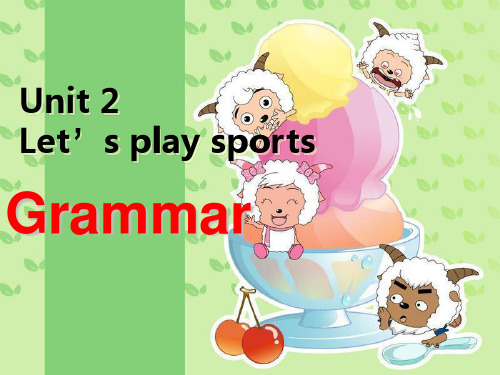
dress --- dresses fix --- fixes
如果动词词尾是-e, 只加-s,读成/Iz/
close – closes
dance --- dances
4、以辅音字母+O结尾的动词加-es /z/
go --- goes
do --- does
5、特殊形式:
have---has
一.写出下列动词的第三人称单数形式: 1) go __g_o_e_s__ 2)like _l_ik_e_s___ 3)say __s_a_y_s__ 4) have _h_a_s___ 5)watch _w__a_tc_h_e_s_ 6)cry _c_r_ie_s__ 7) fly __fl_ie_s___ 8)love _l_o_v_e_s__ 9)enjoy __e_n_jo_y_s__ 10)study _s_tu_d_i_e_s__ 11)wash_w_a_s_h_e_s_ 12)do _d_o_e_s__ 13)buy _b_u_y_s__ 14)teach _t_e_a_ch_e_s_ 15)swim _s_w_i_m_s_ 16)hurry __h_u_rr_ie_s_ 17)enjoy__e_n_jo_y_s_18)miss _m_i_s_se_s__
They play football every week. They don’t play football every week.
Work out the rules
3. 一般疑问句的构成_--_D_o_._.._.._.?__--_Y_e_s_,_…__d_o_. _/ _N_o_,_…__d_o_n_’_t. 将句子改为一般疑问句,并作肯定或否定回答 I like red. ---Do you like red? ---Yes, I do.
牛津译林版七年级英语上册课件:Unit2Grammar
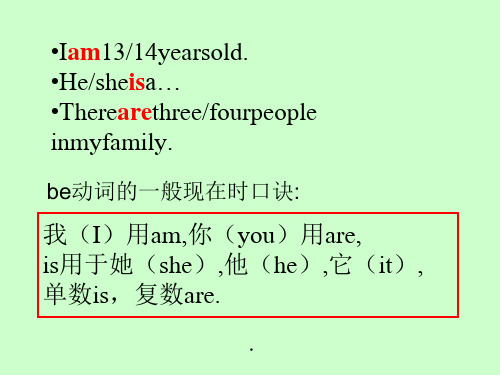
•
动词的第三人称单数形式构成 1.直接在动词后面加s
read reads cook cooks
swim swims use uses
2.以s,x,sh,ch,结尾的动词加es
miss
misses
watch fix
•
watches fixes
finish finishes
teach teaches
(3)以o结尾的动词加-es go
•
Shelikesdrawingverymuch.
doesn’tlike
Sheplaysvolleyballafterschool.
doesn’tplay
Thebabygoesswimmingtwiceaweek.
doesn’tgo
TheboywatchesTVatweekends.
doesn’twatch
play They________(play)footballeveryweek.
•
2.当主语为第三人称单数时谓语动词用 第三人称单数 ___________ 形式。
Shelikesdrawingverymuch. Heplaysvolleyballafterschool. Milliegoesswimmingmanytimesaweek. MybrotherwatchesTVeveryevening. Amy’smothershopsatthesupermarket.
•
watch
donot 主语++ 动词原形+其他. 否定句的构成______________ =don’t
助动词
Ilikered. Idon’tlikered. Youhavebreakfastat7a.m. Youdon’thavebreakfastat7a.m. Theyplaybasketballeveryweek.
动词的第三人称单数形式构成 1.直接在动词后面加s
read reads cook cooks
swim swims use uses
2.以s,x,sh,ch,结尾的动词加es
miss
misses
watch fix
•
watches fixes
finish finishes
teach teaches
(3)以o结尾的动词加-es go
•
Shelikesdrawingverymuch.
doesn’tlike
Sheplaysvolleyballafterschool.
doesn’tplay
Thebabygoesswimmingtwiceaweek.
doesn’tgo
TheboywatchesTVatweekends.
doesn’twatch
play They________(play)footballeveryweek.
•
2.当主语为第三人称单数时谓语动词用 第三人称单数 ___________ 形式。
Shelikesdrawingverymuch. Heplaysvolleyballafterschool. Milliegoesswimmingmanytimesaweek. MybrotherwatchesTVeveryevening. Amy’smothershopsatthesupermarket.
•
watch
donot 主语++ 动词原形+其他. 否定句的构成______________ =don’t
助动词
Ilikered. Idon’tlikered. Youhavebreakfastat7a.m. Youdon’thavebreakfastat7a.m. Theyplaybasketballeveryweek.
牛津译林英语 七年级上册unit2Grammar(共37张PPT)
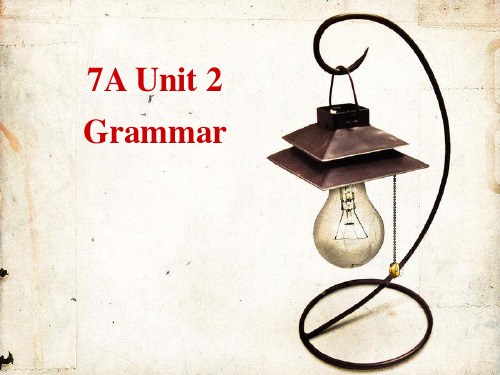
Club every Tuesday.
实义动词的一般现在时的各种句型。 1. 肯定句: (1) 第三人称单数主语+第三人称单数的
谓语动词+…… He enjoys playing football. (2) 其他人称的主语+动词原形+…… I like my school verb after he, she, it like this.
c.I live in Nanjing.
d.I am a student.
e.I have breakfast at 7.00a.m.
f.Nice music makes us happy.
g.Kitty likes stickers.
h.The elephant has long nose.
i.I go to the Reading
We use the simple present tense when we talk about :
things that are always true
things that are true now
a f h c g d b ie
a.Fish lives in water.
b.I go to school every day.
Do Does
do
does
do not/ don’t does not/ doesn’t
What they like/enjoy doing
Use the information to complete the questions. 1. _D_o__ Sandy and Kitty enjoy listening to music?
3. My cousins _e_n_j_o_y__(enjoy) computer games. But they _d_o_n_’_t_e_n_j_o_y_(not enjoy) ball games.
实义动词的一般现在时的各种句型。 1. 肯定句: (1) 第三人称单数主语+第三人称单数的
谓语动词+…… He enjoys playing football. (2) 其他人称的主语+动词原形+…… I like my school verb after he, she, it like this.
c.I live in Nanjing.
d.I am a student.
e.I have breakfast at 7.00a.m.
f.Nice music makes us happy.
g.Kitty likes stickers.
h.The elephant has long nose.
i.I go to the Reading
We use the simple present tense when we talk about :
things that are always true
things that are true now
a f h c g d b ie
a.Fish lives in water.
b.I go to school every day.
Do Does
do
does
do not/ don’t does not/ doesn’t
What they like/enjoy doing
Use the information to complete the questions. 1. _D_o__ Sandy and Kitty enjoy listening to music?
3. My cousins _e_n_j_o_y__(enjoy) computer games. But they _d_o_n_’_t_e_n_j_o_y_(not enjoy) ball games.
译林牛津版七上英语精品课件Unit 2 Grammar

Positive sentences 肯定句
Negative sentences 否定句
I/You/We/They like sports.
He/She/It/Simon likes sports.
I/You/We/They do not (=don't) like sports.
He/She/It/Simon does not (=doesn't) like sports.
行为动词一般现在时的各种句式
He comes from Guangdong. Li Hua plays football every day. Many people like him.
句型一:
主语+行为动词 +其他.
Rule1:一般现在时中,当主语是第三人称单数, 动词第三人称单数;其他人称,动词用原形。
客观真理或科学规律
Simon likes playing football. things that are true now
目前真实存在的事实
比较下列两组句子:
We have dinner at school. You sing very well.
They go to school on Sunday.
句型二: 主语+ don’t/doesn’t+行为动词原形 +其他.
Rule 2:在一般现在时中,当主语是第三人称单数,用 does+not(=doesn’t)进行否定,行为动词改成原形;其 余人称用 do not(=don’t)进行否定。
一般疑问句&肯/否回答
I/You/We/They like sports. Do I/you/we/they like sports? Yes,I/you/we/they do. No,I/you/we/they don't. He/She/It/Simon likes sports. Does he/she/it/Simon like sports? Yes,he/she/it does. No,he/she/it doesn't.
牛津译林版7上 unit 2 grammar 课件 (共14张PPT)

Find out the rules
1. like
likes play
plays
规律一:绝大部分动词直接加S
2. study
studies fly
flies
规律二:以辅音字母加y结尾的,—y+ies 3. watch watches wash washes
dress
dresses fix
fixes
Unit 2 Let’s play sports!
Exercises
1.Jack is a good _p_l_a_y_er__ (play) in our school
volleyball team. He _p_la_y_s(play) volleyball very w__e_ll_(good). 2. My sister and I are in the R__e_a_d_in__g_(read) Club. We are _m__e_m__b_e_rs_(成员)of the club.
•不习惯读书进修的人,常会自满于现状,觉得再没有什么事情需要学习,于是他们不进则退。经验丰富的人读书用两只眼睛,一只眼睛看到纸面上的话,另 一眼睛看到纸的背面。2022年4月9日星期六2022/4/92022/4/92022/4/9 •书籍是屹立在时间的汪洋大海中的灯塔。2022年4月2022/4/92022/4/92022/4/94/9/2022 •正确的略读可使人用很少的时间接触大量的文献,并挑选出有意义的部分。2022/4/92022/4/9April 9, 2022 •书籍是屹立在时间的汪洋大海中的灯塔。
谢谢观赏
You made my day!
我们,还在路上……
Practice 2
牛津七上Unit2 Grammar (共17张PPT)-优质课件
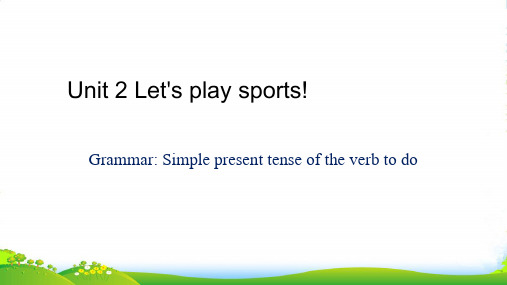
•4. 以 o 结尾的动词加es go→goes do→does
•5. have变成has
总结:行为动词的一般现在时
用法:1. 表示经常做的事、目前的爱好、能力等。
2. 表示不受时限的事实或真理。
肯定句: 主语+动词原形 否定句: 主语+don’t +动词原形 一般疑问句: Do + 主语+ 动词原形…?
Finish the exercises on Page 24.
Exercises
1. Her daughter___d_o_e_s_n_'_t_l_ik_e__ (not like) bread or milk. 2. Jill ___is_n_'_t___(not be) sad.
区分:Jill, ___d_o_n_'t_b_e__(not be) sad. ( D )3. Where_______ he_______ ?
2. 否定句的构成 __d_o_n_o_t_/_d_o_n_'_t _+_动__词__原__形__
• I like red. I don't like black.
• You have breakfast at 7:00 a.m. • You don't have breakfast at 7:30 a.m.
Simple present tense of the verb to do
Millie gets up at 6:30 every morning.
things that we often do 经常做的事
Cats eat fish.
things that are
always true 事实或真理
•5. have变成has
总结:行为动词的一般现在时
用法:1. 表示经常做的事、目前的爱好、能力等。
2. 表示不受时限的事实或真理。
肯定句: 主语+动词原形 否定句: 主语+don’t +动词原形 一般疑问句: Do + 主语+ 动词原形…?
Finish the exercises on Page 24.
Exercises
1. Her daughter___d_o_e_s_n_'_t_l_ik_e__ (not like) bread or milk. 2. Jill ___is_n_'_t___(not be) sad.
区分:Jill, ___d_o_n_'t_b_e__(not be) sad. ( D )3. Where_______ he_______ ?
2. 否定句的构成 __d_o_n_o_t_/_d_o_n_'_t _+_动__词__原__形__
• I like red. I don't like black.
• You have breakfast at 7:00 a.m. • You don't have breakfast at 7:30 a.m.
Simple present tense of the verb to do
Millie gets up at 6:30 every morning.
things that we often do 经常做的事
Cats eat fish.
things that are
always true 事实或真理
牛津译林七年级英语上册unit2 Grammar课件

8. Jordan _p_l_a_y_s__(play) basketball. He _d_o_e_s_n_’t__p_la_y_(not play)
football.
9. I __g_o____(go) swimming on Sunday.
But I__d_o_n_’_t_g_o__ (not go) shopping.
middle school. 3 We_ta_k_e_(take) Eddie for a walk after supper. 4 He_w__a_sh_e_s_(wash) his own clothes every day. 5 His uncle__g_o_e_s_ (go) fishing on Sundays. 6 My friends_h_e_l_p_ (help)me a lot with my Chinese.
• I like playing basketball. • Yi Jianlian is my favourite
basketball player • I like him very much. • I often watch his games on TV.
导
Yi Jianlian _p_l_a_y_s_ (play) basketball very well. Many students l_i_k_e_(喜欢)him. They often _w__a_t_c_h_(watch) his games on TV. In my free time, I _e_n_j_o_y(enjoy) watching TV, too. But my cat _l_i_k_e_s_(like) reading. It often _r_e_a_d__s__(read) story books.
牛津译林版 7上Unit2 Grammar 课件 (共18张PPT)
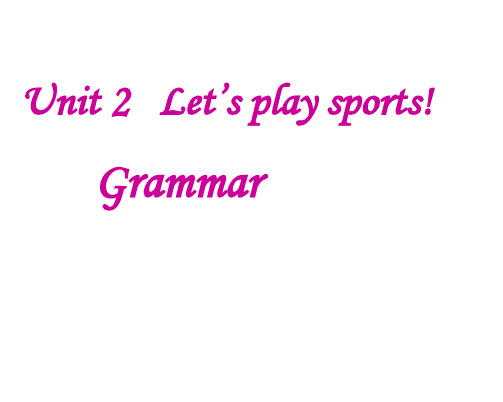
2. I ___g_o___(go) swimming on Sunday. But I ___d_o_n_’t__g_o__ (not go) shopping.
3. My cousins _e_n_j_o_y__(enjoy) computer games. But they _d_o_n_’_t _e_n_jo_y_(not enjoy) ball games.
THE END
谢谢观看
2. Kitty __d_a_n_c_e_s_ very well. 3. Amy ___g_o_es___ swimming every week.
4. Simon often __p_l_a_y_s__ football with his friends.
5. Daniel sometimes __w_a_t_c_h_e_s_ ball games on TV.
2. Eddie likes eating. Eddie doesn’t like eating. Does Eddie like eating? Yes, he does./No, he doesn’t.
用所给单词的适当形式填空。
1. Yao Ming __p_l_a_y_s_(play) basketball. He _d_o_e_s_n_’t_p__la_y_(not play) football.
don’t
• 9、春去春又回,新桃换旧符。在那桃花盛开的地方,在这醉人芬芳的季节,愿你生活像春天一样阳光,心情像桃花一样美丽,日子像桃子一样甜蜜。 2021/3/192021/3/19Friday, March 19, 2021
• 10、人的志向通常和他们的能力成正比例。2021/3/192021/3/192021/3/193/19/2021 2:18:38 PM • 11、夫学须志也,才须学也,非学无以广才,非志无以成学。2021/3/192021/3/192021/3/19Mar-2119-Mar-21 • 12、越是无能的人,越喜欢挑剔别人的错儿。2021/3/192021/3/192021/3/19Friday, March 19, 2021 • 13、志不立,天下无可成之事。2021/3/192021/3/192021/3/192021/3/193/19/2021
3. My cousins _e_n_j_o_y__(enjoy) computer games. But they _d_o_n_’_t _e_n_jo_y_(not enjoy) ball games.
THE END
谢谢观看
2. Kitty __d_a_n_c_e_s_ very well. 3. Amy ___g_o_es___ swimming every week.
4. Simon often __p_l_a_y_s__ football with his friends.
5. Daniel sometimes __w_a_t_c_h_e_s_ ball games on TV.
2. Eddie likes eating. Eddie doesn’t like eating. Does Eddie like eating? Yes, he does./No, he doesn’t.
用所给单词的适当形式填空。
1. Yao Ming __p_l_a_y_s_(play) basketball. He _d_o_e_s_n_’t_p__la_y_(not play) football.
don’t
• 9、春去春又回,新桃换旧符。在那桃花盛开的地方,在这醉人芬芳的季节,愿你生活像春天一样阳光,心情像桃花一样美丽,日子像桃子一样甜蜜。 2021/3/192021/3/19Friday, March 19, 2021
• 10、人的志向通常和他们的能力成正比例。2021/3/192021/3/192021/3/193/19/2021 2:18:38 PM • 11、夫学须志也,才须学也,非学无以广才,非志无以成学。2021/3/192021/3/192021/3/19Mar-2119-Mar-21 • 12、越是无能的人,越喜欢挑剔别人的错儿。2021/3/192021/3/192021/3/19Friday, March 19, 2021 • 13、志不立,天下无可成之事。2021/3/192021/3/192021/3/192021/3/193/19/2021
相关主题
- 1、下载文档前请自行甄别文档内容的完整性,平台不提供额外的编辑、内容补充、找答案等附加服务。
- 2、"仅部分预览"的文档,不可在线预览部分如存在完整性等问题,可反馈申请退款(可完整预览的文档不适用该条件!)。
- 3、如文档侵犯您的权益,请联系客服反馈,我们会尽快为您处理(人工客服工作时间:9:00-18:30)。
5. have much time to talk with her friends 有许多时间与朋友聊天 have a lot of /much time to do sth. 有许多时间干某事 have a little time to do sth. 有一点时间干某事 have little time to do sth. 没多少时间干某事
2. be nice to me = be kind to me 对我好 He is always nice to us. 他总是对我们很好 他总是对我们很好. It’s nice of you to say so. 你这么说真好 你这么说真好. 3. all the time = always 一直,总是 一直 总是 Daniel and I do our homework together all the time. 丹尼尔和我总是一起做作业. 丹尼尔和我总是一起做作业
Complete the conversation
I Simon: Hello, Daniel. ____have good news. it Daniel: Oh, what is the news? Is _____good? He Simon: Peter is now in the school football team. ____ is really good. you Daniel: I think ______are better. We Simon: Thank you. Peter and I both love football. ____ play together all the time. Daniel: Does Millie know about the news? She Simon: Yes. _____is really happy.
school. 5. Is Grandma at home now? I want to say hello to ___. her
you 6. Sorry, I can’t hear _____well. Can you say it again?
language points
1. She walks her dog every day. 她每天遛狗 她每天遛狗. walk him = take him for a walk 带他散步 Do you often walk your dog? 你经常遛狗吗? 你经常遛狗吗
homework together. On Mondays and Wednesdays, Simon
He plays football. _____is a member of the school football
team.
The students at Beijing Sunshine Secondary School meet
What do the pronouns refer to?
1. My name is Millie. I live in Beijing. 2. Sandy, do you know Tommy? 3. Simon loves football. He plays football every day. 4. Millie loves Eddie. She walks him every day. 5. I love my school. It is very big. 6. This is Daniel and this is me. We are in Grade 7. 7. “Simon and Millie, you sit here,” said Mr. Wu. 8. I have many friends. They are all nice to me.
Unit 2
My day
Grammar
Say something about Millie’s school life.
6:30a.m. 7:00a.m. 7:30a.m. 8:00a.m. 8:25a.m. 11:50a.m. Get up Eat breakfast Go to school Do morning exercises Have lessons Eat lunch 1:30p.m. 4:00p.m. 5:00p.m. 5:30p.m. 6:30p.m. 7:00p.m. 9:30p.m. Have lessons Do after-school activities Go home Do homework Eat supper Watch TV Go to bed
4. know a lot about sth. 对……了解很多 了解很多 = know much about sth. He knows a lot /much about China. 他对中国很了解。 他对中国很了解。 He knows a lot of English words. 他认识许多英语单词。 他认识许多英语单词。
Personal Pronouns
Personal Pronouns ( subject form )
第一人称 Singular 单数) (单数) Plural 复数) (复数) I we
第二人称 you you he
第三人称 she it they
they they
主格形式的人称代词在句中作主语。 主格形式的人称代词在句中作主语。
Байду номын сангаас
Complete the following sentences
1. My name is Daniel. ____am 11 years old. I you 2. Hello, Simon. How are _______? They 3. There are Sandy and Amy. ______are playing badminton. We 4. Here are my friends and I. ______are in class 6. He 5. This is Mr. Wu. ____ is our teacher. you 6. Simon and Daniel, are ______reading comic books?
Complete the following sentences
1. I have a lot of new friends at the new school. Do you
them want to know ______? us 2. Mr. Wu is our teacher. He teaches _____English. him / it 3. Millie has a dog. She walks ________ every day. it 4. Simon likes football. We often talk about ____ after
Complete the article
Sandy plays volleyball every Tuesday, Thursday and Friday. She is at the volleyball court from 4:00 p.m. to
They He 5:00p.m. ____meets up with Simon and ______do their
Homework
Tell your partner something about your new friends.
We every lunchtime. Millie and I go to the playground. _____
sit and talk under the big trees there. Daniel goes to the Computer Club every Tuesday
He afternoon. ____ knows a lot about computers. Kitty goes to
her dancing lesson every day. ____is very busy and does She not have much time to talk with her friends.
Personal pronouns ( object form )
第一人称 第二人称 Singular 单数) (单数) Plural 复数) (复数)
第三人称
me us
you you
him them
her them
it them
宾格形式的人称代词用在动词或介词 之后做宾语。 之后做宾语。
Pick out the object form of the personal pronouns.
1. All my friends are very great. I love them very much. 2. My school is very big. I love it very much. 3. Eddie is my dog. I walk him every day. 4. Your mum is right. You should listen to her. 5. They are lovely. Let me buy them for you. 6. Would you please give her a cake?
